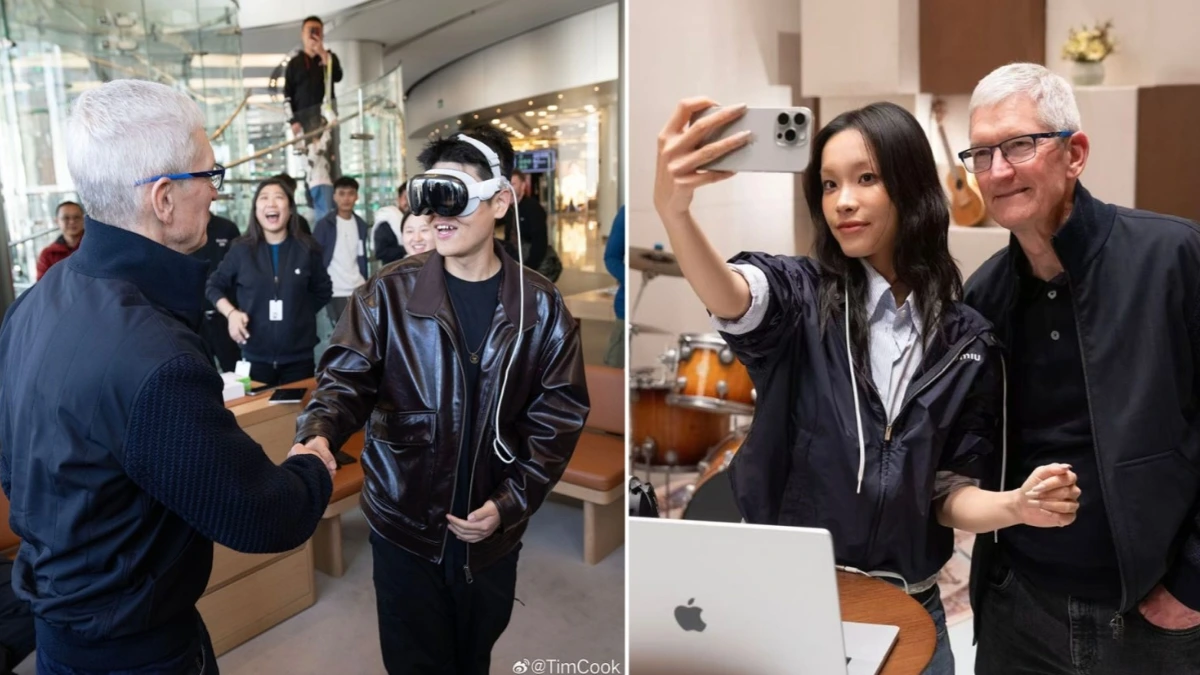Apple Chief Executive Tim Cook’s latest trip to China this week became a centerpiece for the company’s regional marketing efforts, aligning with the long awaited debut of the iPhone Air.
His visit came just as China’s top three telecommunications providers China Mobile, China Unicom and China Telecom secured government approval to begin commercial trials for embedded SIM technology on smartphones, marking a pivotal development for Apple’s presence in the country.
The approval by China’s Ministry of Industry and Information Technology marks the first time that eSIM services will be legally available for smartphones in the world’s second largest economy.
The new technology eliminates the need for a physical SIM card, allowing for slimmer phone designs and improved security through encrypted digital identity verification.
Apple had delayed the iPhone Air’s launch in mainland China for nearly a month due to these regulatory hurdles. The company’s Chinese website confirmed that preorders will open Friday at 9 am with shipments beginning next Wednesday. Prices will start at 7,999 yuan (roughly US$1,122).
“The timing of Cook’s visit appears deliberate,” said Zhang Li, a technology policy researcher in Beijing. “The eSIM approval clears the final obstacle for Apple to bring its latest device to Chinese consumers.”
Apple’s livestream on Douyin, the Chinese version of TikTok, featuring Cook himself, reinforced the company’s marketing push and drew millions of viewers, underscoring Apple’s continued reliance on China for both manufacturing and sales.
Industry analysts view the new approval as a milestone for Apple and a sign of greater openness from Chinese regulators. “China’s smartphone ecosystem is shifting toward digital SIM technology, and Apple’s global design strategy depends on it,” said Lin Qian, an independent telecom analyst based in Shanghai.
However, experts also warn that the rollout may initially be limited to select provinces. “This is still a pilot phase, and carriers will likely focus on major cities first,” Lin said. “The nationwide expansion will take time as network systems and data management frameworks are updated.”
Chinese smartphone manufacturers are expected to follow quickly. Huawei Technologies, Oppo and Vivo have each indicated plans to introduce eSIM enabled models later this year. The change is expected to stimulate domestic innovation and competition in smartphone design.
While Apple has long been a leader in eSIM technology first deploying it in U.S. models years earlier China’s delay has kept the company from offering identical global hardware versions.
The MIIT approval now brings China closer to alignment with markets such as the United States, Japan and parts of Europe, where eSIM has become mainstream.
According to data from GSMA Intelligence, China could represent nearly one fifth of all eSIM smartphone connections globally by the end of this year. Analysts predict that the adoption curve will be steep once the service becomes widely available, given the size of China’s smartphone user base.
“The shift to eSIM will simplify carrier switching, reduce plastic waste and enhance security,” said Yu Bo, a telecom engineer at China Unicom. “It’s a long-term gain for both users and operators.”
At a mobile store in Shenzhen, sales representative Liang Wei said customers had been waiting for the iPhone Air’s release since its international debut last month.
“Many customers were confused about why it wasn’t available here yet,” Liang said. “Once we explain that it’s because of the eSIM approval, they understand and are excited to try it.”
In Beijing, student Chen Yujie, who owns an older iPhone 13, said she plans to upgrade. “I like the idea of a thinner phone and not having to change SIM cards when traveling,” she said. “As long as setup is simple, I’ll switch immediately.”
Meanwhile, a network technician at China Telecom, who requested anonymity because he was not authorized to speak publicly, said internal training sessions on eSIM activation have already begun.
We’ve been testing system compatibility for weeks, he said. “We expect the first wave of activations to start within days.” Apple’s advantage lies in being first to market under the new regulatory framework.
Analysts believe that early success with the iPhone Air could strengthen Apple’s brand position in China’s premium segment, where the company already holds a large share.
Still, challenges remain. Public understanding of eSIM is limited, and concerns about security and data privacy persist among Chinese consumers.
Carriers will need to ensure that users can easily migrate existing numbers and accounts without technical complications. Over the next year, the focus will likely shift toward integration and standardization.
If domestic smartphone brands accelerate adoption, China could emerge as one of the largest eSIM ecosystems in the world, reshaping how mobile connectivity operates in Asia. Tim Cook’s visit to China comes at a critical moment for Apple.
The introduction of eSIM trials removes the final regulatory barrier preventing full rollout of the iPhone Air and positions Apple to benefit from the next wave of smartphone technology in one of its most important markets.
As Chinese carriers begin their commercial trials and consumers prepare for preorders, the world’s biggest smartphone arena is poised to take a significant step toward a fully digital mobile future.
